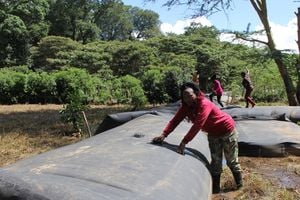Headteachers take on Ruto government over unfulfilled promises

Delegates attending the 46th Kenya Secondary Schools Heads Association annual national conference in Mombasa yesterday.
Secondary school principals on Wednesday expressed displeasure over President William Ruto’s failure to fulfil promises made during the campaigns, saying that the running of schools has been complicated by inadequate funding.
Kenya Secondary Schools Heads Association (Kessha) chairperson Indimuli Kahi said that schools are financially struggling despite a promise in Kenya Kwanza Education Charter to give a minimum amount of money to each school before factoring in capitation, which is based on enrolment.
Mr Kahi said that schools are owed Sh8,901 per learner in unremitted capitation funds. This translates to more than Sh34.7 billion since secondary school enrolment was 3.9 million in 2022 according to the Economic Survey 2023.
“Many times the government has indicated that secondary education is free and that we shouldn’t charge anything. It’s not possible that we can’t charge anything. This funding doesn’t factor in other responsibilities like hiring teachers. Sub-county schools are the most affected since they rely entirely on government capitation. When capitation delays, these schools suffer. We’ll send a fee demand note or send the children home to get that money as parent number one (the government) has not paid,” Mr Kahi said in Mombasa during the annual Kessha conference.
However, Education Cabinet Secretary Ezekiel Machogu disputed the figure quoted by Mr Kahi.
“We have to look at the exact figure. For this year we don’t have a pending bill. Starting to go backwards might not be the road we want to follow. My main aim is to make sure we get the full capitation. The figure they gave includes the time students were not in school during the Covid-19 pandemic. That’s where they’re missing the point,” Mr Machogu told the Nation in an interview.
Dr Ruto had promised that his administration would improve the capacities of day secondary schools “to guarantee access to quality education and reduce the cost of education”. It is estimated that 72 per cent of learners in secondary schools attend day schools. He also pledged to connect all schools to the internet and establish a special tariff for schools for utilities like water and electricity.
Mr Kahi called on the government to increase the capitation per learner from Sh22,244 to Sh30,000.
“We have huge budget deficits. As schools, we’ve no leeway to meet the budget deficits. We only have two sources of money: government and school fees,” Mr Kahi said.
The Kenya Kwanza manifesto also promised to increase capitation for learners with disabilities by 50 per cent and to set aside 15 per cent of public funded bursaries for them.
Mr Machogu also announced that the government will revert to the regular 50:30:20 disbursement ratio, which was disrupted in 2021 when schools reopened after the Covid-19 enforced closure.
“I understand the challenges and the constraints that these delays cause to operations in your schools. I want to assure you that we are working diligently to streamline the disbursement systems, by employing advanced technologies and automated processes to expedite the flow of funds,” the CS said.
Principals who spoke to the Nation said that apart from the money owed by the government, parents also owe schools in unpaid fees.
“I head a sub-county school with an enrolment of 560. Parents owe the school about Sh2 million but we also owe suppliers over Sh4 million so even if all the parents pay, we’ll still be in debt,” said a principal from Embu County.





